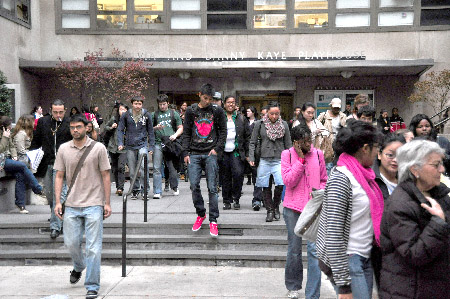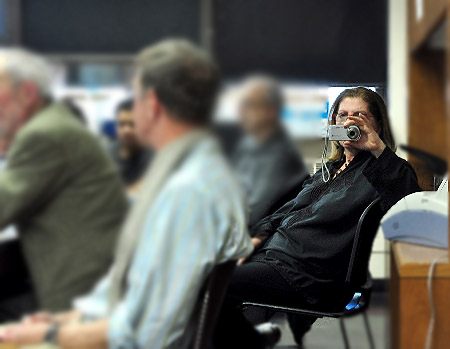Crisis in Journalism: A Microcosm
The battle in D:F/M over the direction of the journalism curriculum (reflecting the many conflicts of the internecine war of several years also ongoing in D:F/M) forced me into a publish or perish mode. This post is one of the results.
I know from spending time at the Poynter Institute, visiting the McCormick Foundation, being involved with numerous projects and activities of New America Media, the New York Times Foundation, New York Community Media Alliance, the Ford Foundation, and so many more other activities, and reviewing studies and proposals and engaging in forums and discussions – I engage more than any other Colleague in my department if not at the College – that the discussions and battles and intrigue resonating and burning in D:F/M reflect in some ways what is going on in the business and profession at large.
I’ve also been re-reading The Reconstruction of American Journalism by Leonard Downie Jr. and Michael Schudson. It was released in October, 2009. And I’m planning to use it in my journalism ethics and responsibility class this semester.
Other college and university programs are probably wrestling with this issue of burgeoning technological change but most, I am assuming, eschew the maniacal internecine struggles that threaten students’ education. My Colleagues are just too cavalier about the curriculum.
So, I’m posting here a draft of an opinion that was written in Spring, 2009, but for reasons I can’t recall was never disseminated in my department – or at least it appears it was never sent – though many of the themes and topics have been circulated by me for years. Now, that my department is on the verge of voting on curriculum changes that I’ve been saying for a long, long time are antediluvian and effete that I have made clear that I will not support when it comes to a vote, I am publishing here one of what I call an A Cassandra Moment.
This is the crux of the issue. The Powers That Be in D:F/M have been flummoxed by the burgeoning technology. The students enrolling in D:F/M classes, however, are media savvy, that is, they have been using media extensively well before they ever enrolled in our classes. They write. They use photographs. They produce videos. They do a lot more.
Flummoxed, D:F/M Colleagues have opted for not to address the change happening rapidly before their eyes.
So …
I) D:F/M needs a course that serves as a portal for journalism just like the ones for media and film. That is, to major and to take classes in the department, students must take a portal class. I’ve reviewed Media 180 as taught by Bob Stanley and Peter Parisi. It has been for years the required course for students interested in majoring in media and taking J- classes. I proposed a long time ago that there should be a another portal class. Without going into detail, two Colleagues sabotaged a good idea, substituting this course, Journalism and Society , an elective class which is not portal and is basically a course about media posing as a journalism class. It seriously lacks breadth and the first two de-emphasize journalism way too much.
Statements at the last meeting that journalism was essentially relegated to one lecture in a 15-week semester because the profession is regarded with contempt and is going out of business (I guess that means Democracy, too), is savagely revealing of the level of thinking in F/M regarding journalism. That is, the level of thinking has lacked the critical and intellectual depth that I’ve heard colleagues say that they want in the curriculum. So: I strongly suggest a portal level “Journalism and Mass Media” or “Journalism and Mass Communication” with the emphasis on journalism (without ignoring its interconnections/workings with film, advertising, public relations and other forms of media).
Students should come into the news writing courses with some advanced knowledge that include such topics and issues as Community Journalism, Citizen Journalism and the role of weeklies, especially in New York City, from the corporate-own chains, like the “recent” Murdoch acquisitions, to the independents and free ones. Students should also have some awareness of ethnic/immigrant news publications and issues as well as evolving forms of journalism, such as blogging and video-blogging and some students would argue that the social networking sites are journalistic (I don’t think so but they do and, who knows, such sites might morph into a real journalism form).
Some colleagues were involved in the recent Grassroots Media Conference but except for one course, that’s Professor Stein’s, I don’t see anything from that conference reflected in F/M curriculum. I’m not saying that it should be or shouldn’t be though in a J/Mass Com class it could be.
Students should be aware of trade publications (AKA business-to-business media), newsletters, etcetera. Neighborhood cable TV access channels are very progressive and have journalistic programming but are in no way on the radar of department curriculum as they should be in terms of what role they play in NYC and what roles they can play in helping students prepare for internships and jobs.
I’ve left out a lot but not so much that an introductory course couldn’t accommodate. And, yes, the portal class should address the crisis in journalism which was so poorly articulated in our last [faculty] meeting.
II) Journalism needs representation, just like film and media, on the P&B and P&C committee. And to be blunt: We need someone who understands journalism. We can talk of collegiality and collaboration but C&C can develop better with a sounder structure.
III) Regarding portfolios, I don’t believe adjuncts should be responsible for managing/editing/operating online or off-line publications for their students. I think the adjuncts should be responsible for students in their classes completing assignments that can be submitted for publication, which I believe can strongly prepare them for the second part of the sequence. I don’t think it’s a big deal that students competing the first semester of the news writing-basic reporting sequence (whatever we call it), in order to pass the course, have to have completed two or three articles to be submitted to a student publication (My students are required publish at least three).
I believe that should also occur in the second semester. In my reasoning, students need to have a good set of portfolios by their junior year. I would say 6 to 12 published pieces at a minimum. I’m talking about writing here but there are other media, such as podcasting and online broadcasting. However, I think that needs to be discussed.
Something I quickly observed requiring students to write for publication resulted in a strong demarcation between students who did the homework and those who refused.
IV) One of my main gripes has been – under two chairs with significant support from the P&Bs – the spurious portrayal of the WORD as department property or its portrayal as a reflection of what the department does or does for its students while at the same time F/M shunned the mechanism that makes it work, said mechanism being requiring students to write for publication. This particular practice of the department’s tradition of smoke & mirrors needs to be trashed. Either we make this portfolio process a serious part of the curriculum or we leave it to individual instructors to decide what they want to do and support them – not undermine them.
V) I believe the benefits of the former – required portfolio development – can make the department look good (the chairs and the P&Bs obviously believed that or there wouldn’t have been the kind of interference that has been ongoing for years. I don’t need to address that in depth here. But reserve the right, so to speak, to address it later in a fashion of my choosing. Portfolio developmentlmost definitely can make our students more competitive in the intern-ship, job, grad school market. And I believe it can be done without increasing instructors’ burdens, significanlty, if we developed the news writing sequence. But the adjuncts will have to be seriously involved and supported.
VI) We need to do something about broadcast journalism even if only on a minimal level. The department has resisted for years having students develop broadcast portfolio experience but one or two instructors – such as the adjunct Mike Cokkinos – has had students in his class producing news-type shows that were broadcast on CUNY-TV. I can’t recall accurate the number produced in a semester but it definitely was not more than 3. Broadcast journalism is in a limbo. The department has TV production but I’m not sure if that’s in media or film but it should be in journalism. I have other ideas for discussion.
VII) I want to take the WORD to the next level of development, making it more interactive for student involvement and more of a medium for disseminating news and information, and I also want to explore ad revenue. Because the WORD has been on line for more than seven years, it has a modest online presence and I am constantly getting requests about advertising. That means a significant upgrade should be considered. I also think we should be discussing the concept of journalism labs, especially if students are involved in producing content for disseminating news and information.
VIII) Students have been complaining for years that the so-called analytical, theoretical courses in media studies are redundant. We need to be aware of this.

